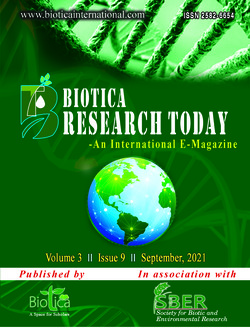
Single Cell Protein - An Alternative Microbial Protein Source
K. Abarna*
Dept. of Aquatic Environment Management, Fisheries College & Research Institute, Thoothukudi, Tamil Nadu Dr. J. Jayalalithaa Fisheries University, Tamil Nadu (628 008), India
V. Rani
Dept. of Aquatic Environment Management, Fisheries College & Research Institute, Thoothukudi, Tamil Nadu Dr. J. Jayalalithaa Fisheries University, Tamil Nadu (628 008), India
N. Manimozhi
Dept. of Aquatic Environment Management, Fisheries College & Research Institute, Thoothukudi, Tamil Nadu Dr. J. Jayalalithaa Fisheries University, Tamil Nadu (628 008), India
DOI: NIL
Keywords: GMO, Microbes, Protein, SCP production
Abstract
The term single-cell protein (SCP) is used to describe protein derived from cells of microorganisms such as yeast, fungi, algae and bacteria which are grown on various carbon sources for synthesis. The dried cells of microorganisms or the whole organism is harvested and consumed. This is a protein source for human food supplements and animal feeds. SCP production may have potential for feeding the ever-increasing world population. Massive quantities of SCP can be produced in a single day. As a source of protein, it is very promising with potential to satisfy the world shortage of food while population increases.
Downloads
not found
Reference
Goldberg, I., 1988. Future prospects of genetically engineered single cell protein. Trends in Biotechnology 6(2), 32-34.
Nasseri, A.T., Rasoul-Amini, S., Morowvat, M.H., Ghasemi, Y., 2011. Single cell protein: production and process. American Journal of Food Technology 6(2), 103-116.
Sharif, M., Zafar, M.H., Aqib, A.I., Saeed, M., Farag, M.R., Alagawany, M., 2021. Single cell protein: Sources, mechanism of production, nutritional value and its uses in aquaculture nutrition. Aquaculture 531, 735885.
Venkataraman, L.V., Becker, W.E., Shamala, T.R., 1977. Studies on the cultivation and utilization of the alga Scenedesmus acutus as a single cell protein. Life Sciences 20(2), 223-233.
Xie, D., Jackson, E.N., Zhu, Q., 2015. Sustainable source of omega-3 eicosapentaenoic acid from metabolically engineered Yarrowia lipolytica: from fundamental research to commercial production. Applied Microbiology and Biotechnology 99(4), 1599-1610.
